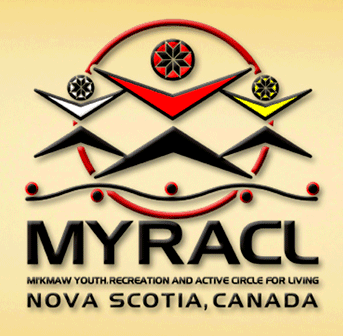The NSMSRC studied the formation of the Nova Scotia Mi’kmaw
Summer Games to it’s beginnings back in 1977 in Chapel Island, Cape Breton. The
original games for Mi’kmaw had it’s start as the Maritime Indian Summer Games
which were held prior to 1977 in Big Cove, Kingsclear and Tobique, New Brunswick. They
were also held in Nova Scotia in the communities of Indianbrook and Eskasoni. These games
were from what we can gather, funded through regional Federal government dollars at Indian
Affairs from per capita regional funding.
The Maritime Indian Summer Games had a conflict with Nova Scotia
communities almost immediately as these Maritime Games were being held on the dates that
were planned yearly for the Chapel Island St. Anne’s Mission in Chapel Island and
Merigomish, Nova Scotia. These dates were considered sacred as flocks of Mi’kmaw
gathered at these two locations to pay homage to the Patron Saint of the Mi’kmaw.
The result of this conflict with dates was the formation of the
Nova Scotia Indian Summer Games with hosts of the games being alternated between Nova
Scotia communities year after year.
The following is a list of the Nova Scotia Indian Summer Games
hosts in the past twenty (20) years and the funding amount that the Department of Indian
Affairs and Northern Development contributed to the Games. While the funding
certainly was workable in the early 1970's, the lack of a structured and organized events
lead to most of our Games suffering financial losses that our communities ended up
burdened with.
Although partnerships for many of these Summer Games were present
with local or provincial governmental bodies, history basically outlines that the need for
an organized Aboriginal Sports & Recreation organization was needed as far back as the
first Nova Scotia Mi'kmaw Summer Games. The reason for this was the simple reason
that these Games brought together hundreds, if not over a thousand, of Nova Scotia's
Mi'kmaw athletes, cultural performers, families and fans to these events.
Some communities opted on not hosting the Summer Games such as
Bear River and Horton First Nations. After 1987, Waycobah First Nation took the initiative
to host these Nova Scotia Indian Summer Games twice, once in 1989 and most recently in
1994. These games were modestly successful and did develop community sport and recreation
facilities locally. They did experience difficulty in funding as they had to use all of
their local and community support mechanisms to make this possible, making this a very
difficult task to complete.
It is very important to note that these games brought much needed
development in sporting / recreation facilities such as ballfields, track and fields,
horseshoe pits and cultural grounds to host communities. It was a landmark developmental
tool - but the problem was that these games did not have any infrastructure dollars and
communities had to tap from within their areas for whatever they could obtain support from
in a very short time period, one year at the most. The other problem was that there was no
real accountability process put in place and tools such as technical packages and bidding
criteria packages even in the milder sense just were not available or developed.
For this reason, most Summer Games were a success attendance and
event wise, but organizationally, they were not. Also, most communities felt the burden of
financial pitfalls after the games when they realized the budgets put in place were
severely over drawn and now they had to deal with it. This made it very difficult for
future communities to host these type of games. Granted, some Summer Games were a lot more
successful than others, but some were not well attended, organized or planned.
From these games, we also cannot forget the enormous impact they
had other than the financial woes. They brought together athletes, coaches, friends,
families and other cultures to a place where they could celebrate their talents in sports,
recreation and culture. The diversity even within our own culture is a celebration during
large scale events such as this. Other cultures also come and enjoy the festivities and
talents of our people. From these games, the pride in our culture and heritage was
nurtured in our people, it was a very important time - a gathering and celebration of our
nations.
It is a must that we continue to celebrate in the midst of our
challenges as Mi’kmaw peoples living on ancestral lands - we need to continue in
positive ways and setting examples that enrich the lives of our children now and in the
future to come.

![]()
![]()
![]()
![]()
![]()
have
visited this site since June 2001.